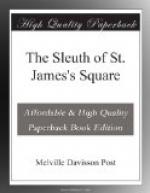“Monsieur, I have said his mind was Hellenic, like his big, wonderful body. Mark you how of heroic antiquity it was! It was his boast, among the perils that constantly beset him, that no criminal should ever take his life; that, if ever he should receive a mortal wound from the hand of the assassins about him, he would not wait to die in agony by it. He himself would sever the damaged thread of life and go out like a man!
“Observe, monsieur, how like the great heroes of legend — like the wounded Saul when he ordered his armor-bearer to kill him; like Brutus when he fell on his sword!”
He looked intently at the American.
“Doubtless, monsieur,” he went on, “those near this man along the Monongahela did not appreciate his attitude of grandeur; but to us, in the distance, it seemed great and noble.”
He looked out over the Mediterranean, where the great adventurers who cherished these lofty pagan ideals once beat along in the morning of the world.
“On an afternoon of summer,” he continued like one who begins a saga, “this man, alone and fearless, followed a violator of the law and arrested him in a house of the village. As he led the man away he noticed that an Italian followed. He was a little degenerate, wearing a green hat, and bearing now one name and now another. They traversed the village toward, the municipal prison; and this creature, featured like a Parisian Apache, skulked behind.
“As they went along, two Austrians seated on the porch of a house heard the little man speak to the prisoner. He used the word sparate. They did not know what he meant, for he spoke in Italian; but they recognized the word, for it was the word used in the mines before the coal was shot down. The prisoner made his reply in Italian, which the Austrians did not understand.
“It seemed that this man who had made the arrest did not know Italian, for he stopped and asked the one behind him whether the prisoner was his brother. The man replied in the negative.”
The Count paused, as though for an explanation. “What the Apache said was: `Shall I shoot him here or wait until we reach the ravine?’ And the prisoner replied: `Wait until we come to the ravine.’
“They went on. Presently they reached a sort of hollow, where the reeds grew along the road densely and to the height of a man’s head. Here the Italian Apache, the degenerate with the green hat, following some three steps behind, suddenly drew a revolver from his pocket and shot the man twice in the back. It was a weapon carrying a lead bullet as large as the tip of one’s little finger. The officer fell. The Apache and the prisoner fled.
“The wounded man got up. He spread out his arms; and he shouted, with a great voice, like the heroes of the Iliad. The two wounds were mortal; they were hideous, ghastly wounds, ripping up the vital organs in the man’s body and severing the great arteries. The splendid pagan knew he had received his death wounds; and, true to his atavistic ideal, the ideal of the Greek, the Hebrew and the Roman, the ideal of the great pagan world to which he in spirit belonged, and of which the poets sing, he put his own weapon to his head and blew his brains out.”




